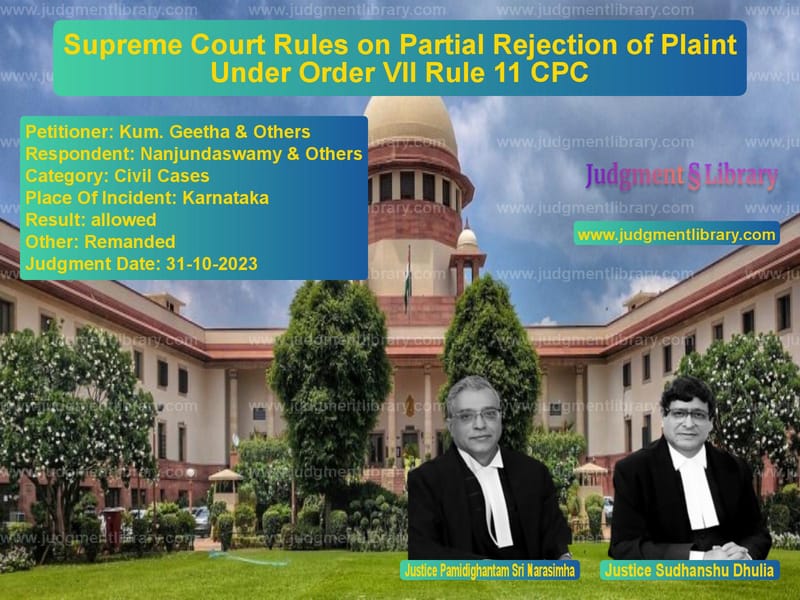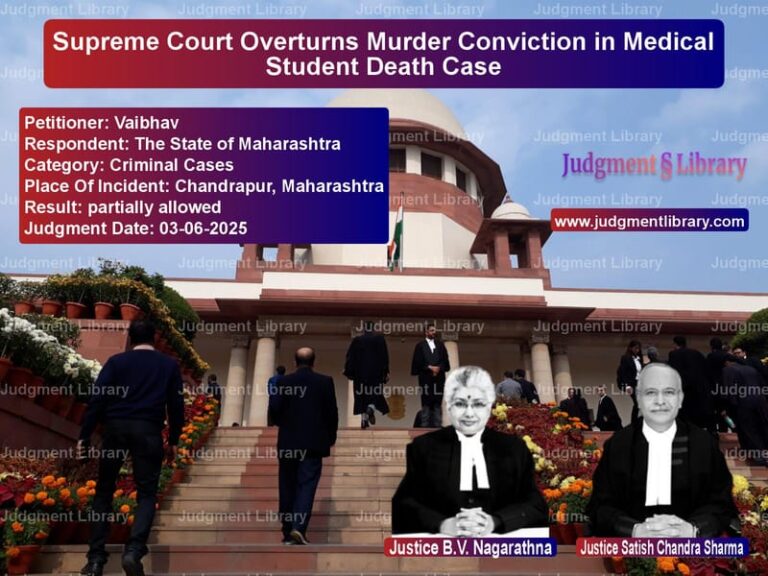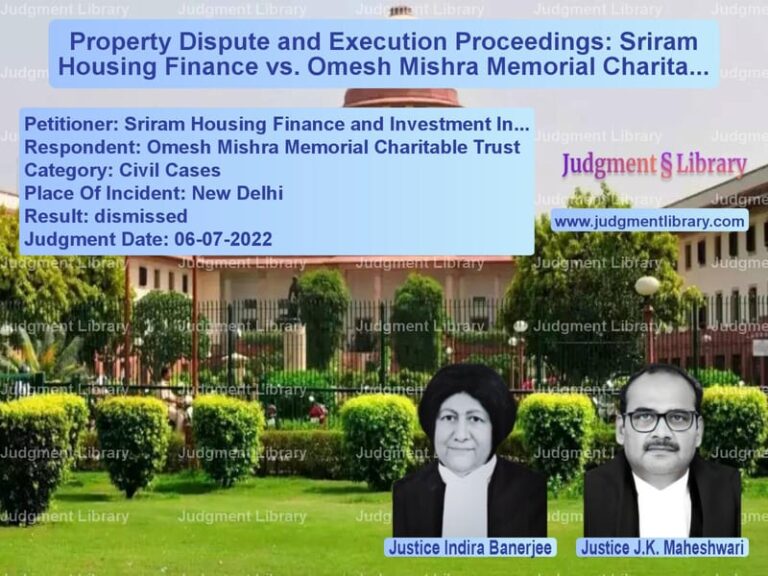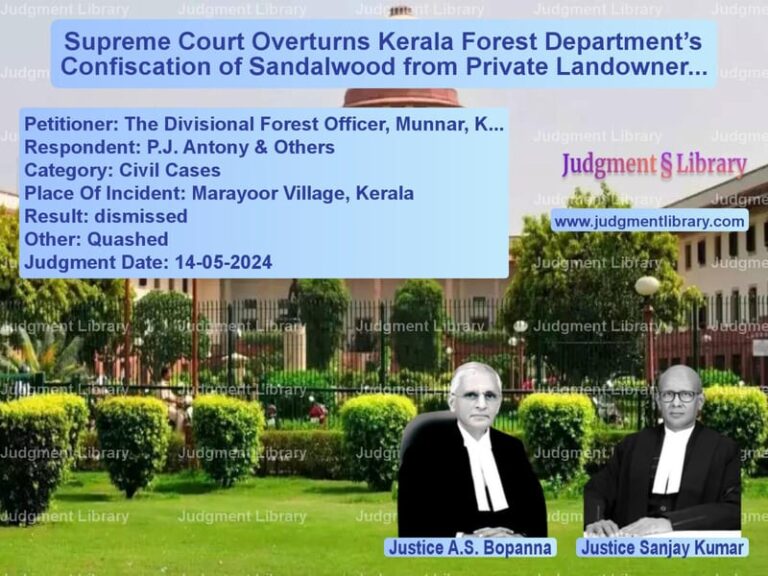Supreme Court Rules on Partial Rejection of Plaint Under Order VII Rule 11 CPC
The Supreme Court of India has delivered a crucial ruling in the case of Kum. Geetha & Others v. Nanjundaswamy & Others, clarifying the principles governing the rejection of plaints under Order VII Rule 11 of the Civil Procedure Code (CPC). The judgment reaffirms that a plaint cannot be rejected in part and sets out clear guidelines for when a plaint should be summarily dismissed at the threshold.
Background of the Case
The case revolves around a dispute regarding ancestral joint family property. The plaintiffs, including Kum. Geetha, filed a suit seeking partition and separate possession of properties described in Schedule A and Schedule B of the plaint. They claimed that the properties were subject to ancestral rights and should be divided accordingly.
The defendants challenged the suit, arguing that one of the properties (Survey No. 76/1, listed in Schedule A) had been sold as far back as 1919 via a registered sale deed. They filed an application under Order VII Rule 11 of the CPC, seeking rejection of the plaint on the grounds that it did not disclose a cause of action for this specific property.
While the trial court dismissed the defendants’ application, the Karnataka High Court partially allowed it. The High Court ruled that the plaint should be rejected only with respect to Schedule A property while permitting the case to proceed for Schedule B property. The plaintiffs challenged this ruling before the Supreme Court.
Legal Issues in the Case
The Supreme Court was called upon to decide:
- Whether the High Court correctly applied the principles governing Order VII Rule 11 CPC.
- Whether a plaint can be rejected in part while allowing the suit to continue for other claims.
- What constitutes a cause of action, and whether the plaintiffs’ pleadings warranted a full trial.
Arguments by the Petitioners (Plaintiffs)
The plaintiffs, represented by legal counsel, argued:
- The entire property remained part of the joint family estate and was never permanently alienated.
- Even if a sale deed existed from 1919, their claim was based on reconveyance transactions that restored ownership to the family.
- The trial court correctly dismissed the rejection application, as the plaint sufficiently disclosed a cause of action.
- The High Court exceeded its jurisdiction by partially rejecting the plaint, which is impermissible under Order VII Rule 11 CPC.
Arguments by the Respondents (Defendants)
The defendants, represented by counsel, contended:
- The property in Schedule A was sold more than a century ago, and no document contradicted this fact.
- The plaintiffs had failed to challenge the validity of the sale deed.
- The High Court rightly exercised its discretion to prevent a frivolous claim over a property that no longer belonged to the joint family.
Supreme Court’s Observations
On the Applicability of Order VII Rule 11 CPC
The Court reiterated that the power under Order VII Rule 11 CPC is meant to terminate sham or vexatious litigation at the outset. However, it stressed that courts must be cautious while exercising this power:
“The remedy under Order 7 Rule 11 is an independent and special remedy, wherein the court is empowered to summarily dismiss a suit at the threshold if it is satisfied that the action should be terminated on any of the grounds contained in this provision.”
On the Requirement of a Cause of Action
The Court analyzed whether the plaint, taken at face value, disclosed a cause of action:
“If the averments made in the plaint are taken in their entirety, in conjunction with the documents relied upon, would the same result in a decree being passed? If so, the plaint cannot be rejected.”
The Court observed that the plaintiffs’ claim regarding nominal sale deeds and reconveyance transactions required factual determination and could not be dismissed outright.
On Partial Rejection of a Plaint
The Court ruled that the High Court had committed a fundamental error by rejecting the plaint in part:
“A plaint has to be rejected as a whole or not at all. Order VII Rule 11 does not permit rejection of only a portion of the suit while allowing the rest to continue.”
It cited the precedent in Sejal Glass Ltd. v. Navilan Merchants (P) Ltd., (2018) 11 SCC 780, which held that a plaint cannot be bifurcated for rejection.
Final Judgment
The Supreme Court set aside the High Court’s ruling and restored the suit in its entirety, allowing the plaintiffs to pursue their claims over both Schedule A and Schedule B properties.
Key Takeaways from the Judgment
- A plaint must be rejected as a whole or not at all. The court cannot reject part of a suit while allowing the rest to proceed.
- Factual disputes must be resolved through trial. If the plaint discloses a possible claim, it must be examined through proper evidence.
- Courts must exercise caution in rejecting suits at the threshold. A meaningful reading of the plaint should be undertaken before invoking Order VII Rule 11 CPC.
Conclusion
This ruling strengthens the principles governing the rejection of plaints and ensures that plaintiffs are not prematurely denied the opportunity to prove their claims. By upholding the importance of a complete trial, the Supreme Court has reaffirmed the fundamental right of access to justice.
Petitioner Name: Kum. Geetha & Others.Respondent Name: Nanjundaswamy & Others.Judgment By: Justice Pamidighantam Sri Narasimha, Justice Sudhanshu Dhulia.Place Of Incident: Karnataka.Judgment Date: 31-10-2023.
Don’t miss out on the full details! Download the complete judgment in PDF format below and gain valuable insights instantly!
Download Judgment: kum.-geetha-&-others-vs-nanjundaswamy-&-othe-supreme-court-of-india-judgment-dated-31-10-2023.pdf
Directly Download Judgment: Directly download this Judgment
See all petitions in Contract Disputes
See all petitions in Property Disputes
See all petitions in Specific Performance
See all petitions in Legal Malpractice
See all petitions in Landlord-Tenant Disputes
See all petitions in Judgment by P.S. Narasimha
See all petitions in Judgment by Sudhanshu Dhulia
See all petitions in allowed
See all petitions in Remanded
See all petitions in supreme court of India judgments October 2023
See all petitions in 2023 judgments
See all posts in Civil Cases Category
See all allowed petitions in Civil Cases Category
See all Dismissed petitions in Civil Cases Category
See all partially allowed petitions in Civil Cases Category







